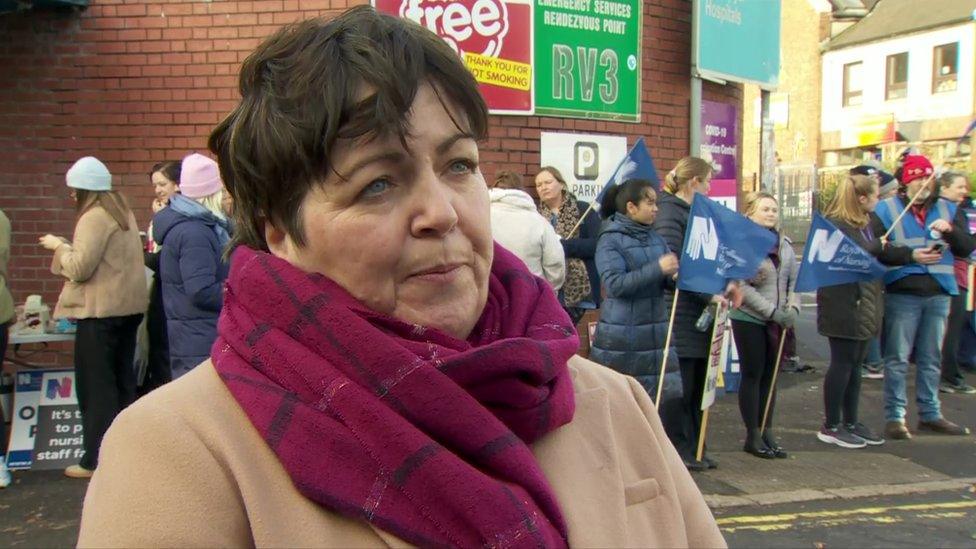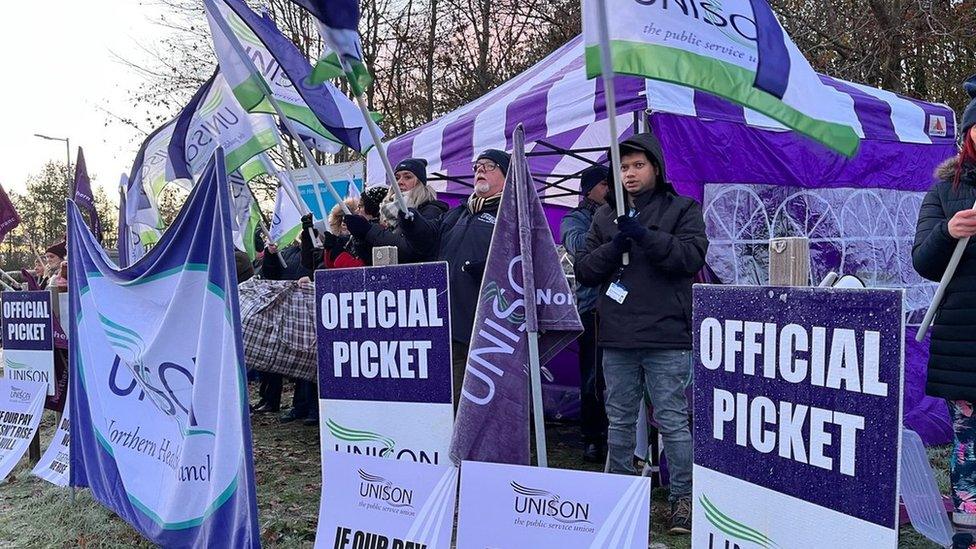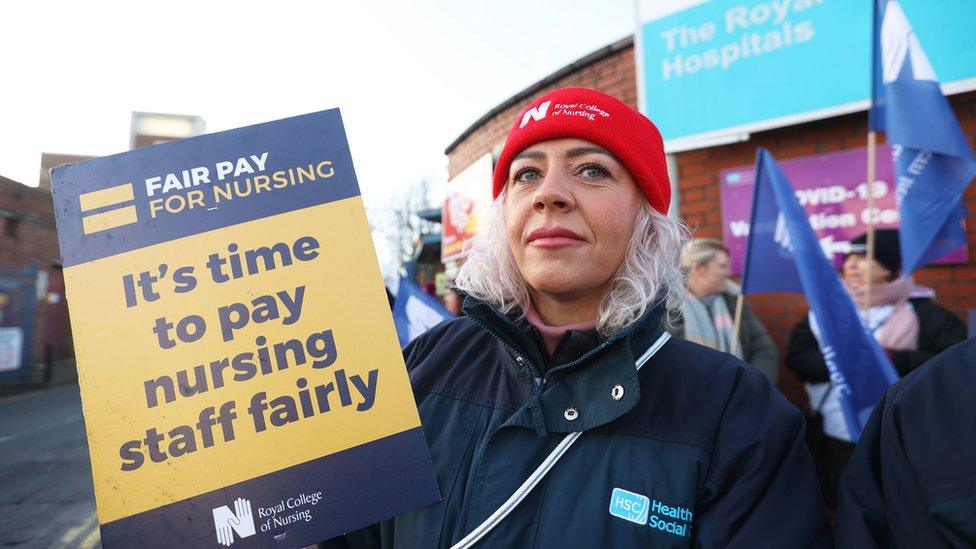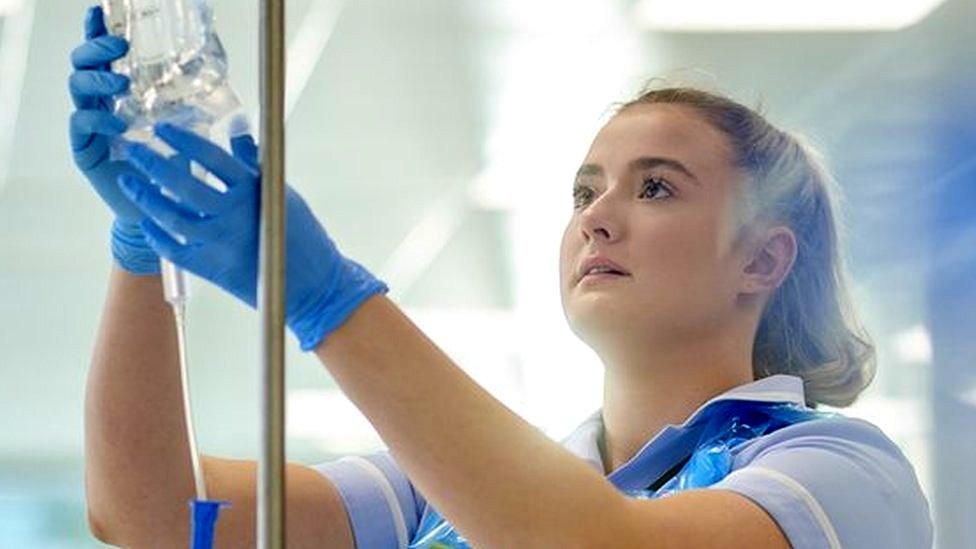Nurses' strike: RCN warns of further action over pay row
- Published

Nurses in Northern Ireland may have no alternative but to take further strike action if there has been no pay offer by autumn, the NI director of the Royal College of Nursing (RCN) has said.
Rita Devlin said nurses had been treated "like second-class citizens".
Her comments come after the Department of Health said there was no money for an uplift in a submission to an independent pay review body, external.
Ms Devlin said members were becoming increasingly frustrated over pay.
On Thursday, more than one million public sector workers in England and Wales, including teachers, police and doctors were told they would be offered pay rises of about 6%..
Under a deal set out earlier this year, NHS workers will receive a 5% pay rise. Ambulance workers, nurses, physiotherapists and porters will also get a one-off sum of at least £1,655.
Stormont's Department of Health said it did not have the funding to cover such a rise in Northern Ireland.

Rita Devlin from the RCN said without a pay offer problems with staff retention and recuitment will worsen
Ms Devlin told BBC News NI's Good Morning Ulster programme that nurses were growing increasingly frustrated over pay.
If by autumn "there is no offer on the table, no change in the political situation, if nothing changes, I do not believe we have an alternative (to strike action)", she continued.
She added that nurses can make "a significantly increased amount of money" by working outside Northern Ireland, in other parts of the UK or the Republic of Ireland.
A spokesperson for the Northern Ireland Office said the UK government "has no authority to negotiate pay in Northern Ireland".
'No funding for pay award'
The pay review body said the Department of Health's submission highlighted pay in Northern Ireland may fall behind other parts of the UK.
It added this risks "significantly deteriorating the position of the NHS workforce in Northern Ireland compared to the rest of the UK".
"The Department of Health told us there is currently no funding for a pay award and they would have to bid for funding from the Department of Finance," the body continued.
"They said they needed any pay award to be fully funded by HM Treasury."
The body added it was concerned with what the department had said about affordability, telling it "there was no capacity to afford a pay uplift for 2023-24 without implementing corresponding cuts to expenditure on services or additional funding being made available".

Nurses took part in industrial action earlier this year
On Thursday, a number of trade unions representing other parts of the public sector warned of industrial action in Northern Ireland if there was no progress on pay, with most decisions devolved to Stormont ministers.
There is currently no functioning executive or assembly at Stormont because of the Democratic Unionist Party's (DUP) protest against post-Brexit trading rules.
It has instead been left to the Northern Ireland secretary to set a budget.
However, departmental budgets are being squeezed, partially as a result of an overspend last year.
On Thursday, Liam Kelly from the Police Federation of Northern Ireland said officers wanted clarity on whether a similar pay deal to England and Wales would apply in Northern Ireland.
"At this stage our officers are entitled to know if they are getting 7% or if, for the first time, there will be a break with pay parity," he said.


Funding a 7% pay rise would be a financial headache for the Police Service of Northern Ireland in the current landscape.
It has earmarked £18m in its budget for a wage increase for about 6,500 officers.
But that only equates to a 5% uplift, at a time when it is looking into a £40m black hole in its finances.
The Department of Justice ultimately decides things.
Previously, Northern Ireland has followed the rest of the UK in terms of officer pay awards.
There are now concerns among officers parity could be broken.
Police officers cannot go on strike, so they do not have the same leverage as other parts of the public sector.
Implementing any parallel 7% rise for prison officers would be equally challenging.

'Reached the limit'
The head of the Northern Ireland Civil Service has warned that Stormont departments had "reached the limit" of what they can do to manage budget pressures this year and another overspend is looming.
Jayne Brady warned the government there remains an unfunded pay pressure of £571m, and a further £437m of pressures requiring decisions.
A spokesperson for the Department of Finance said pay awards "need to be viewed in the context of the available budget".
"Relevant Northern Ireland departments will consider the recommendations made by the pay review bodies and the local implications," they added.
A separate pay review body said consultants, dentists and GPs in Northern Ireland should get a 6% pay rise in line with the rest of the UK, external.
Implementing that in Northern Ireland would cost about £40m and it does not appear there is the money available.
Meanwhile, Justin McCamphill, from the teaching union NASUWT, said teachers "will vote with their feet" if their pay falls behind other regions.
"If we don't invest in our young people, we won't have an economy for the future," he said.
"So the government needs to look at the decisions it's been making."


There has been stalemate over a pay deal for teachers in Northern Ireland for over two years.
The last pay rise teachers got was for the 2020/21 school year.
There have been some big hikes in the cost of living since then, which have hot teachers like other workers.
Teachers have had to look on as their counterparts elsewhere in the UK have received rises - though not without strikes and strife in some cases.
The upshot is a teacher's salary in Northern Ireland is often thousands of pounds behind those in England, Scotland and Wales.
For instance, a new teacher in Northern Ireland gets just over £24,000 a year while in England that is now set to rise to around £30,000.
Pay deals are negotiated and agreed locally in Northern Ireland between the unions and management bodies like the Department of Education and Education Authority.
But with an education budget under severe pressure, and no Stormont, chances of a deal anytime soon are slim.

Related topics
- Published5 July 2023

- Published22 May 2023

- Published7 July 2023
